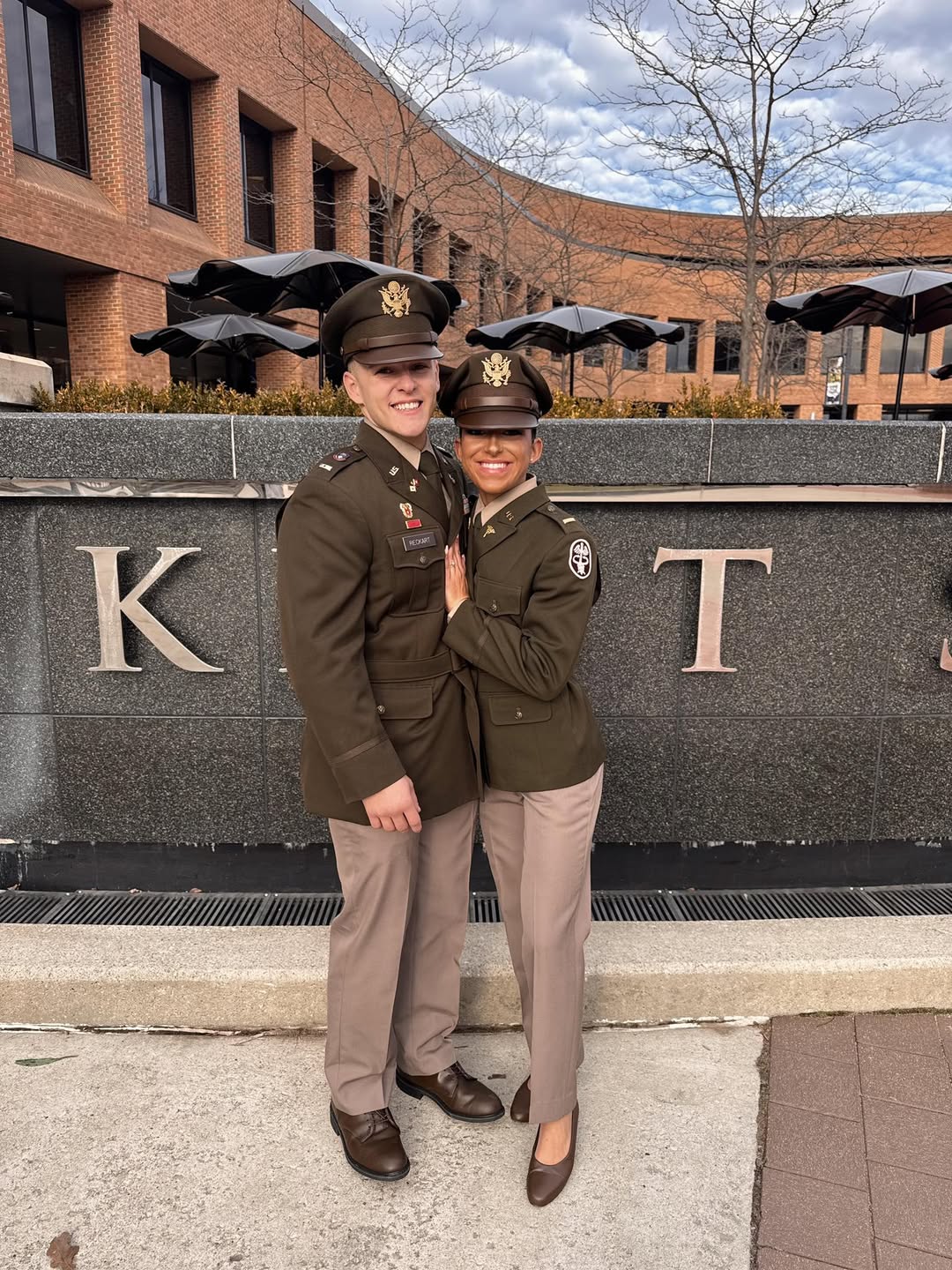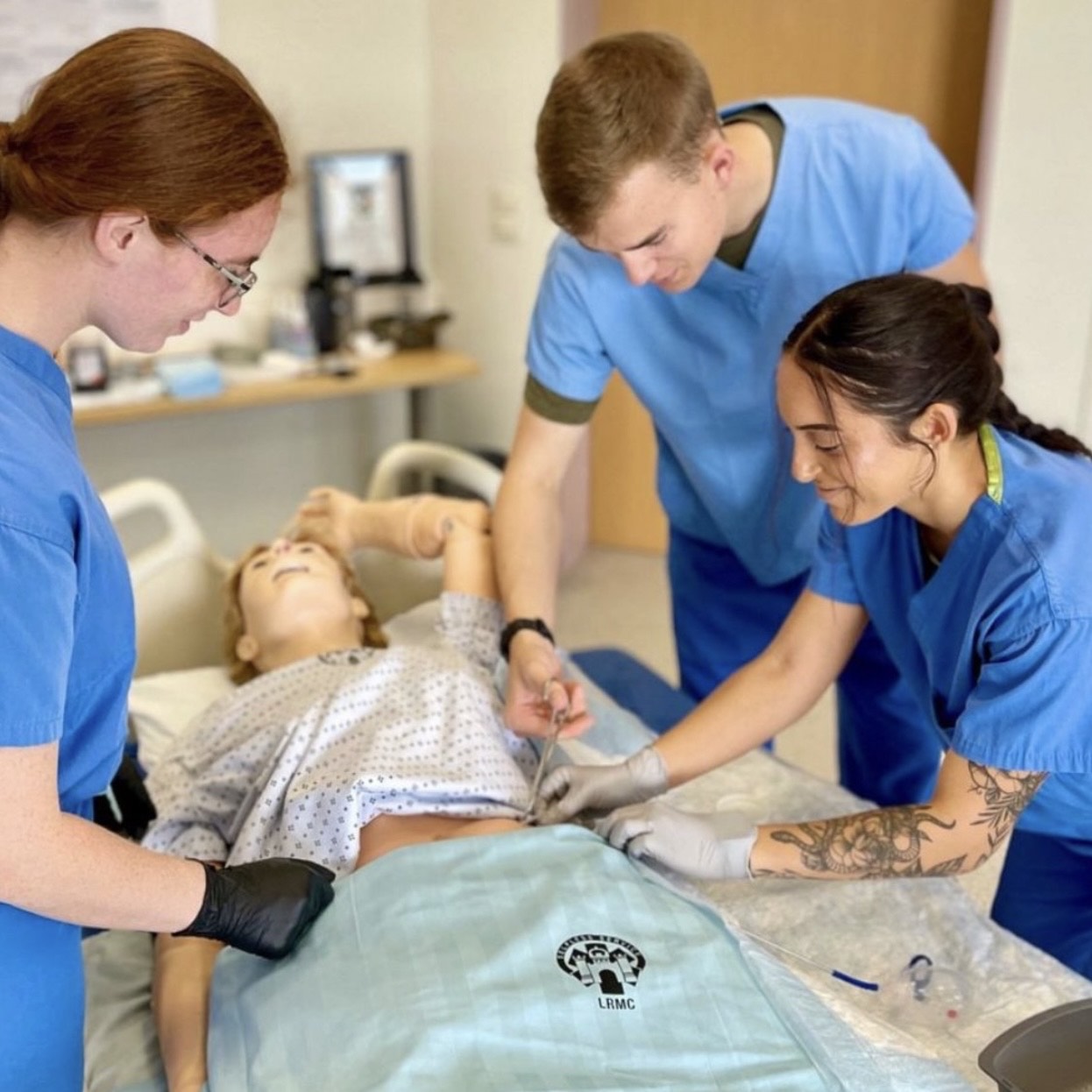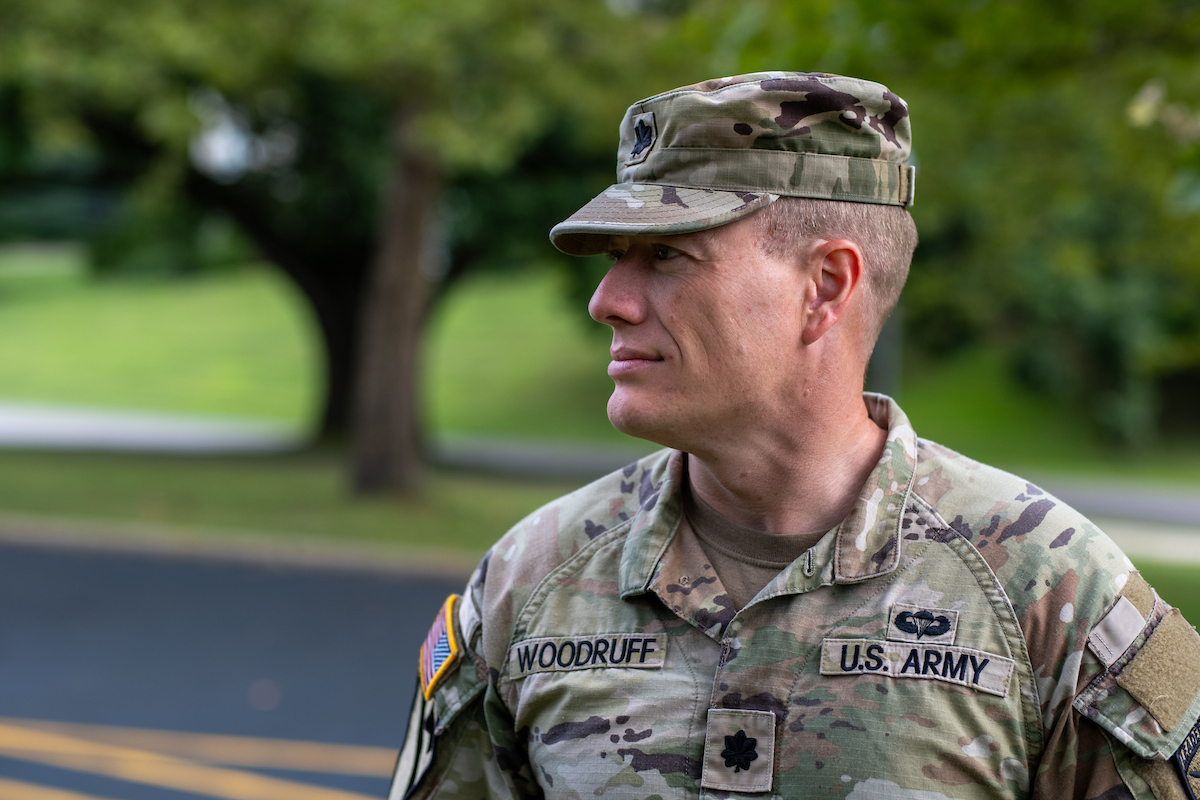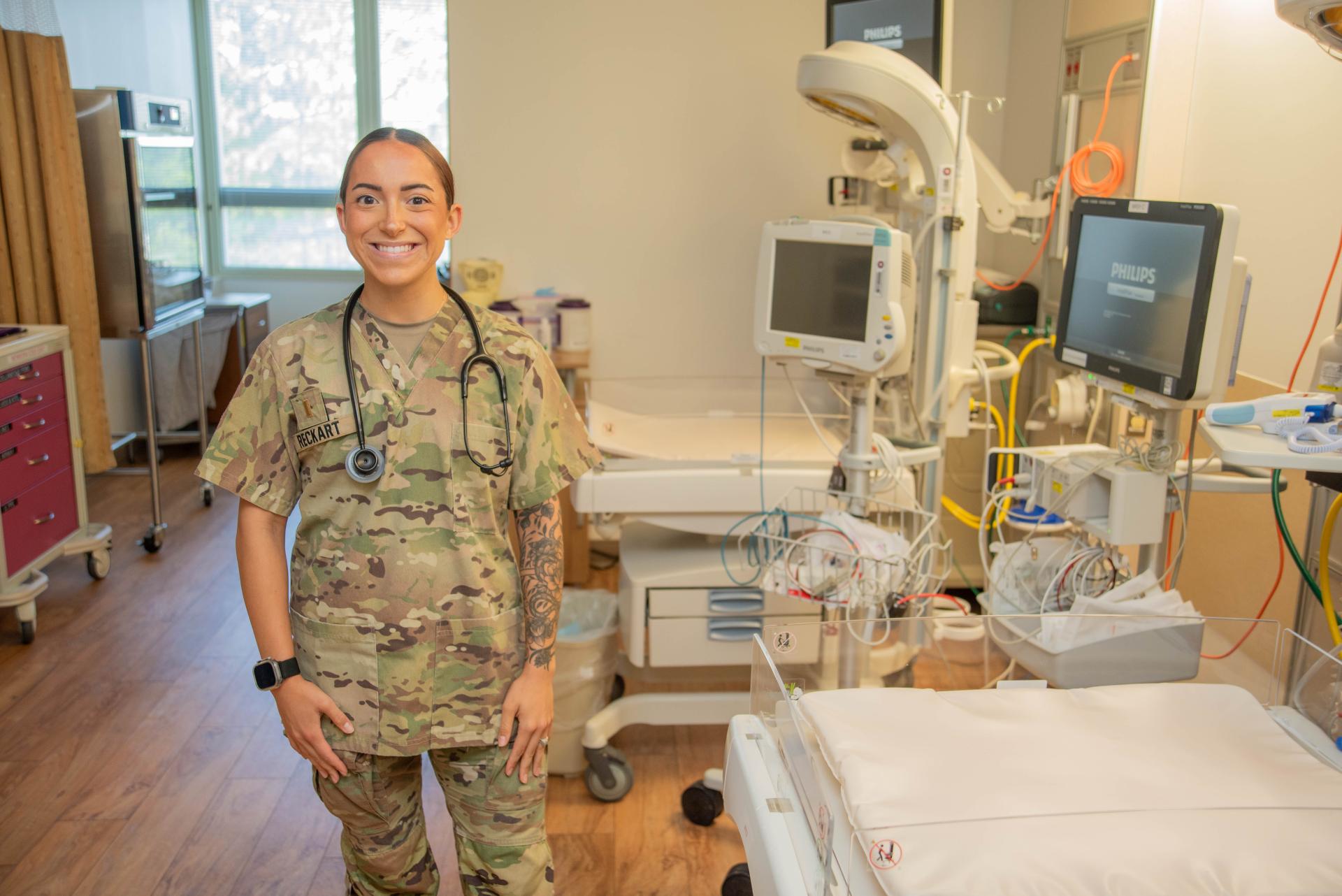Imagine how dirty and tired a U.S. Army soldier becomes during fast-moving combat field training.
By contrast, imagine how clean and alert a nurse needs to be to work with newborn babies and their mothers in a busy hospital.
Now, try to imagine shifting quickly and seamlessly between the two worlds, and if you can, then maybe – just maybe -- you can walk a mile in Fiona Reckart’s shoes, or in this case, boots.
It was during the same week in December 2023 that Reckart earned her bachelor's degree in nursing from Kent State’s College of Nursing and was commissioned as a second lieutenant via Kent State’s Reserve Officer Training Program (ROTC).
Crossing these simultaneous finish lines took commitments from Reckart and from the leaders of both programs to collaborate in ways not always found at other universities.
More than a year later, the partnership has paid off as now-U.S. Army 2nd Lt. Reckart is combining what she learned in these two challenging worlds in her role as a postpartum nurse at Womack Army Medical Center at Fort Bragg, N.C.
"I felt like the demands of the Kent State Nursing Program prepared me pretty well [for Army life] just because that program required a lot out of you and you had to adapt to a lot of different situations,” Reckart said.
Family Tradition Meets Kent State Opportunities
Reckart grew up in Columbia Station, a small township in rural Lorain County about 40 miles from Kent that boasts only 7,500 residents.
From a young age, she saw the military as more than just a calling to make the world a better place.
"I come from a big military family, and I also have a couple family members who work in public service,” Reckart said. “I really wanted to be able to help others and also use my healthcare knowledge to be able to do that on a military installation."
Reckart’s parents, Cherie and Leroy Medina, are both veterans with service in the U.S. Marine Corps, while her older brother, Brandon, serves as a captain in the Ohio Army National Guard having also earned a commission from Kent State’s ROTC program.
Not to be outdone, Fiona’s twin brother, Casey, enlisted in the United States Air Force just as she began her quest to earn her commission.
So maybe it’s not surprising that Fiona’s career goals ultimately connected her with the man who would become her husband, Devin Reckart, when both were cadets in Kent State’s ROTC program. She pinned Devin with his lieutenant bars when he earned his commission in the spring of 2023, and he returned the favor later that year for Fiona.

Today they’re both serving at Fort Bragg in Fayetteville, North Carolina.
Looking back, Reckart recognizes that achieving her professional goals meant finding a university that offered the best of both worlds.
"The main reason why I wanted to attend Kent State University specifically for nursing was because I heard very good things about the Kent State Nursing Program,” Reckart said.
All Paths Lead to Germany
In the summer of 2023, Reckart faced a tough balancing act, needing to complete high-level internship hours treating real patients to stay on track with her nursing requirements while also needing to complete field training requirements in an active-duty military setting to enhance her leadership abilities.
But how to do both?
Turns out the answer was 4,000 miles away from Kent State as Reckart was offered an opportunity to work at Landstuhl Regional Medical Center in Landstuhl, Germany.
The assignment met the criteria for both programs, and allowed Reckart to stay on track.
"Nurses through our ROTC have an opportunity to go to what we call the nurse summer training program, where they actually get to go to an active-duty basic Army hospital,” said Bill Terry, recruiting operations officer for Kent State’s ROTC. “They work and shadow an Army nurse and get real experience prior to commissioning as an Army nurse.”
Bill Terry"What's really good about it is they're also enrolled here at Kent State for clinicals during that time. They're able to actually get credit for both programs. So that's another way we work together to achieve both goals.”
Reckart stepped up and completed the training ahead of her final semester at Kent State, which included her selection as cadet battalion commander, the program’s top student leadership position.
Military leaders with Kent State’s ROTC program counsel students on their commitments after earning their commission as officers; some will accept the challenge of performing the job of an Army officer every day in the active duty forces and others will continue their service part-time in the Army Reserves or Army National Guard.
For Reckart, the choice was easy as she looked to enter active duty and serve full-time, so she needed to have a mastery of her skills.

“Trying to learn how to become a nurse, take the tests and exams and all of those things while also learning the clinical knowledge on top of also learning the Army and kind of what the expectations were,” Reckart recalled. “The Army knowledge was very, very new to me, and it didn't come naturally to me. So, I was splitting my time to be super involved in both and try my best to grow in both areas.”
Her strong efforts and commitment weren’t lost to her instructors, who often engage with cadets before sunrise.

"Nursing students have a lot of early morning requirements with their clinicals, and a lot of times that conflicts with our required physical training, which takes place at 6 in the morning,” said Lt. Col. Joshua Woodruff, professor of Military Science and commander of Kent State’s Army ROTC program.
As physical fitness is an aspect of both roles, Woodruff notes that the ROTC will excuse nursing students from physical training so they can commit those hours to nursing requirements, which in turn helps the students to graduate on time.
“It's good if we can find ways to meet those requirements concurrently so that it doesn't overload the student,” Woodruff said. “If we burn the student out, they're not going to be good for us and they're not going to be good in their nursing studies. We want obviously what's best for them ultimately and that ends up being best for us too."
Path to BSN
- Prerequisites & Admission (Year 1)
Complete science courses and meet the 2.75 GPA requirement for nursing program entry - Foundation Skills (Year 2)
Learn core nursing fundamentals through coursework, labs, and initial clinical experiences - Specialized Training (Years 3-4)
Complete clinical rotations across all patient populations and specialty areas, including a 144-hour capstone practicum - Professional Licensure
Pass the NCLEX examination to become a Registered Nurse (RN)
Path to Army Commission
- Basic Training (Years 1-2)
Complete Basic Course or 32-day Basic Camp covering fundamental Army skills and leadership development - Advanced Training (Years 3-4)
Master military strategies through Advanced Course and pass rigorous 35-day Advanced Camp - Physical & Leadership Standards
Maintain fitness requirements and demonstrate leadership capabilities throughout program - Service Commitment
Pledge to serve as commissioned Army Officer upon graduation
‘Meeting Students Where They Are’
Both nursing and commissioning programs mandate significant training hours outside of the classroom.
Often at the same time.

“We have a responsibility to the nursing profession to support these great students in achieving their goal of becoming nurses. Given the ongoing nursing shortage, we also have an important obligation to society to help prepare the future nursing workforce,” said Mary Kutchin, Ph.D., nursing professor. “And when you have qualified people who have some limitations on their time, how do we help these students be successful?
"Our goal is to meet the student where they're at ... so we're flexible where we can be flexible to help them meet the rigors of the nursing program."
Kutchin speaks with pride when speaking about nursing students like Reckart who are trying to accomplish a great deal in a short period of time and to do so in service of their country.
"I have a special regard for ROTC students,” Kutchin said. “I know they are strong dedicated people and will be strong nurses. They also stand the wall and defend and protect our country.”
Kutchin said she and other nursing faculty appreciate the collaboration with their ROTC colleagues as both want to see students meet the tough standards and succeed.
"[Student cadets] tend to be the very strong students because they are organized and disciplined,” she said. “They do have other very important obligations in ROTC, and they're very dedicated to be the best they can be."
The Payoff
“Looking back through my journey from Kent State to now, it convinces me that it was well worth it,” Reckart reflected. “My route to becoming an Army nurse was everything that I've gained along the way. Whether it's my confidence, my leadership abilities, my clinical knowledge, everything like that."
Today, Reckart is still up early with her physical fitness and continues to balance a heavy schedule while serving her country and making a difference at Fort Bragg.
She recognizes the team behind her at Kent State who helped remove obstacles so she could succeed.
“In addition to being a brand-new Army officer and nurse in the Army, due to the demands of the Kent State Nursing Program ... I felt like Kent State and the ROTC program prepared me pretty well to be the best I could have been.
“I definitely think that the Kent State Nursing Program, but also the Army as well, has helped me grow as a nurse, but also as a person.”

